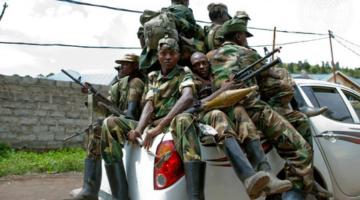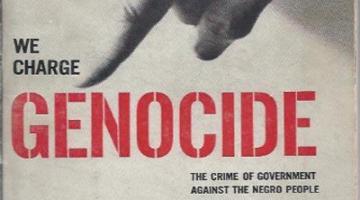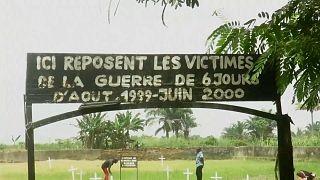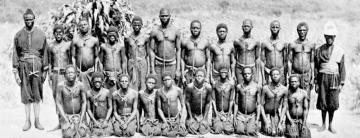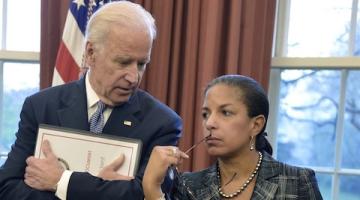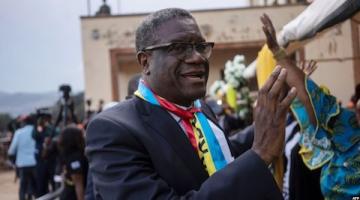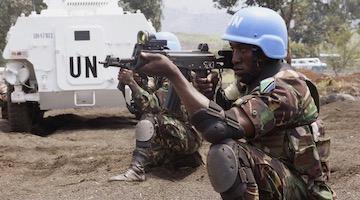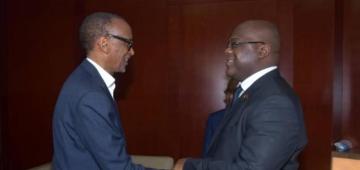“Kabila was always just a creature of the foreign powers underneath him.”
The following has been excerpted from Judi Rever’s compelling new book, with permission of the publisher, Random House Canada.
I wanted to flesh out some troubling details on how the Rwandan-led rebel alliance had swept across Zaire so quickly, and do a profile on their financial enablers. Details were emerging as to how the United States government and Western-backed business had assisted the rebel army at the height of the refugee killings. The information was limited but solid: On April 16, 1997, more than a month before Mobutu was toppled and less than a week before Rwandan troops were to machine-gun and slash refugees south of Kisangani, Laurent Kabila’s finance minister, Mwana Nanga Mwampanga, signed a $1-billion mining deal with America Mineral Fields (AMF), whose headquarters was in Hope, Arkansas, President Bill Clinton’s hometown. Jean-Raymond Boulle, the company’s CEO, was close enough to Clinton to receive an invitation to his first inauguration. Boulle gave rebels the use of his Lear jet and advanced $1 million in mineral taxes and fees to Kabila in return for a contract to rehabilitate and develop the country's zinc and copper mines, a project that was estimated to be worth $16 billion.
On April 17, the New York Times ran a story boldly stating that the Zairean rebels’ new allies were men armed with briefcases:
“A week after Shaba Province fell to Laurent Kabila and his rebel troops, mining company executives are swarming around this region of mineral riches and signing lucrative deals despite the uncertainty hanging over the nation’s future. Less than two days after Lubumbashi was captured last Thursday, the executives were already flying into the city aboard private jets and setting up shop in the Hotel Karavia.
They could be seen meeting at poolside and over meals with the rebels’ finance minister and the newly appointed Governor of the province. The stakes here are enormous. The province has billions of dollars in untapped mineral reserves. The rolling fertile land holds millions of tons of cobalt, copper and zinc.”
“Less than two days after Lubumbashi was captured, the executives were already flying into the city aboard private jet.”
A few days after Rwandan soldiers massacred refugees in Mbandaka—and a week before Kabila seized the capital—Boulle flew a group of investment bankers, market analysts and US officials to an area of Congo under rebel control. The US officials were Robin Sanders, Director of African Affairs for the National Security Council, and Congresswoman Cynthia McKinney, a Democrat from Georgia. In a matter of weeks, I’d get hold of a promotional video from AMF aimed at investors interested in making a profit from mining deals in the war-riven country, sent to me by a market analyst friend of mine in Vancouver.
“The government alone is not going to be able to resolve all the problems that the area possesses,” Congresswoman McKinney stated in the video. “It’s going to take a public-private partnership and it’s going to take a strong business climate, and strong investment. Investment, though, with a social conscience. Investment that cares about the environment and work environment, and, of course, the government and people in the area.” At the same time, just prior to the fall of Kinshasa, the Canadian group Tenke Mining paid $50 million to Gécamines, the state mining outfit that was already under the control of the rebels. That these business deals were all being negotiated in the wake of serious bloodletting did not seem to register with the US administration or Canadian and American business interests.
“Kabila allowed himself to be at the forefront of ethnic cleansing.”
During the rebel advance across Zaire, I’d kept in close contact with a mining analyst in South Africa who worked as an intermediary between investors and rebels selling mining concessions. His company was tracking political and military developments in the country, and regularly fed news agencies and rich investors with detailed updates about the AFDL’s territorial gains. The mining analyst had an acute grasp of history and knew all the major players. He never wanted to be quoted by name, but he was willing to give me deep background and never minced words. He would eventually tell me flatly that Western investors knew but did not care about the body count. “The expression being bandied about in political and financial circles was that these refugees were dead men walking,” said the analyst. “Those people are gone. It’s disgusting, but they [the Rwandan soldiers] killed them. Kabila allowed himself to be at the forefront of ethnic cleansing.The Rwandans clearly had as their chief agenda to create a cordon sanitaire. You have to remember that those Rwandans [the bulk of Kagame’s army] had spent many years living in Uganda waiting for their chance to get back in Rwanda.” He was referring to the decades in exile Kagame and his military colleagues spent after their Tutsi families had been forced to flee violence in Rwanda in 1959. “The last thing they were going to do is let displaced people from Rwanda [the Hutu refugees in Congo] do the same thing they did. They were going to get rid of these guys.”
The AFDL, he said, was “never a domestic political force, it was a grouping of foreign powers.” Kabila’s army comprised “Rwandans, Ugandans and Angolans. That’s it. Kabila was a front. He was always just a creature of the foreign powers underneath him.”
“Bechtel reportedly helped the rebels unseat Mobutu.”
The market analyst predicted a complete geostrategic restructuring in central Africa, with Rwandan Tutsis, an ethnic group that had faced existential threats for decades, now steering affairs. “You’ll see a de facto ‘Greater Tutsi Land’ there. What you’ve got is a situation where Rwanda and Uganda are clearly now the dominant military powers in the region. They will do pretty much what they want.”
But what did that mean for the Congolese? I asked. What was going to happen to them? And what could possibly justify such a dramatic shift?
“The real truth about Zaire is that it was potentially very rich. Even though it was hugely corrupt and a very violent place, it was quite probably not as violent and was not as corrupt as Russia. But in Russia [business] people were dealing with a legitimate regime and they were able to do business. In Zaire, the difficulty was that everybody knew Mobutu was going to collapse, but didn’t know when. And as a result, investment just didn’t happen. Now he’s gone and you’ve got a government that is legitimate in the eyes of the Americans. And the Americans, like or lump it, are the people who count at the moment. And that means that investment will take place. People will go in, they will develop the assets in Congo, which are world-class. They may do so from behind barbed wire, they may do it from fortresslike enclaves, but Zaire will be developed.”
My source was unable to predict the extent of Congo’s future collapse in this reconfigured “legitimate state.” And the mostly invisible hand of the US government was hard to see at first too, though there was already some brilliant reporting on its role.
“You’ll see a de facto ‘Greater Tutsi Land’ there.”
Before I left for Congo, I’d contacted Kathi Austin, who was tracking weapons dealers and war profiteering networks for Human Rights Watch. She told me to follow Bechtel, a US-based company that had reportedly helped the rebels unseat Mobutu. I was unable to unearth much in Kinshasa, but Robert Block, a journalist from the Wall Street Journal, had already looked into this shadowy yet powerful engineering giant.
He reported that Bechtel was drawing up a “master development plan” for Congo and providing high-tech intelligence for Kabila’s new government, free of charge. Bechtel commissioned and paid for US National Aeronautics and Space Administration (NA SA) satellite studies of the country and for infrared maps of its mineral potential. Some of the satellite data gave Kabila useful military information before Mobutu was toppled, Block pointed out. In exchange, Bechtel, which designs and builds projects for mining companies, became first in line to win contracts.
Bechtel’s links to US intelligence officials, former politicians and military personnel have made it one of the most powerful and secretive corporate entities in the world. The company had been accused of being a US shadow government. In Congo, the satellite data it provided on mineral deposits were considered part of supra-governmental “black projects”—highly classified military or defense initiatives. And all these secret deals were being struck in 1997 amid the tremendous loss of human life that the involved governments refused to acknowledge.
Excerpted from In Praise of Blood: The Crimes of the Rwandan Patriotic Front by Judi Rever. Copyright © 2018 Judi Rever. Published by Random House Canada, a division of Penguin Random House Canada Limited. Reproduced by arrangement with the Publisher. All rights reserved.

